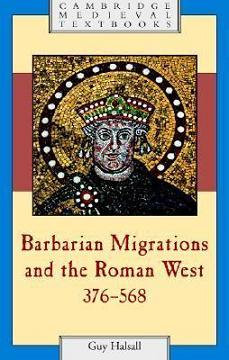
Barbarian Migrations and the Roman West 376-568
Guy Halsall
591 pages including index
published in 2007
I spent the week between Christmas and New Year's Eve with my parents in Middelburg and took advantage of this visit to check out the town's library, which used to supply most of my reading back before I moved to Amsterdam. It turned out to be an wise decision as less than an hour browsing found half a dozen excellent history books to read, including this one. Guy Halsall is an author I had just seen slagged off by Peter Heather in his book Empires and Barbarians for being Completely Wrong about the impact of barbarian migrations on the late Roman Empire. This piqued my interest to see how exactly Halsall's interpretation of the end of the Roman Empire differed from Heather's views and if Halsall's explanations make any sense on their own.
To my not inconsiderable surprise, it turned out that the story Halsall puts forward in Barbarian Migrations and the Roman West 376-568 does not differ quite so much as Heather made it seem. They don't so much disagree on what happened as on why it happened and on where the emphasis should be placed. To keep it simple, Heather believes barbarian invasions are the cause the collapse of the Roman Empire in the west, while Halsall argues they are an effect of the collapse. It was the weakness of the western empire that made possible the barbarian takeover of various provinces. Another major point of disagreement is on the composition of the "barbarian hordes": Heather has argued that the more classical image of entire population groups invading the empire is largely correct, with caveats, while Halsall sees them more as proper armies rather than tribes. Ultimately these differences in intepretation however for me were less important than the sheer quality of Halsall's history.
For my money, Barbarian Migrations and the Roman West 376-568 is the best one volume history on the end of the Western Roman Empire I've read so far. It's not the only book on the subject you should read, because there is so much disagreement between historians about just exactly what happened and why, but it's an excellent start. What Halsall does well is to put his history in the context of the continuing historiographically debate taking place about the Fall of Rome and how the world of the Western Roman Empire was transformed in the transition from Late Antiquity to Early Middle Ages. In this debate we've long since moved on from the classical ideas about huge massess of barbarian invaders overrunning the west of course, as well as from the backlash against this that got under way in the sixties with readings of history that stressed the continuities between the late Roman world and the Early Middle Ages. Halsall stands sort of midway between these two approaches.
In Halsall's own words, Barbarian Migrations and the Roman West 376-568 "presents the end of the Roman Empire and the barbarian migrations as a dramatic, bewildering, massively important and comparatively short-term sequence of events, whose results were all the more dramatic and bewildering for being unintended". It wasn't inevitable in other words, but largely caused by the actions of the rulers and important actors within the Roman Empire responding to specific, internal crisises rather than barbaric hordes hammering the gates, but these crisises did open the door for new political entities to take over parts of the empire in the end.
Like Gaul, Halsall's book is divided in three parts. In the first part, Halsall describes the world of the (Western) Roman Empire and its neighbours. This part also serves as an introduction to the whole problem of the Fall of Rome and the role "barbarians" played in this. He also goes into detail on the thorny question of identity, not an unimportant topic in a period where the boundaries between "barbarian" and "roman" were suddenly much more fluid. Finally, this part also shows how interconnected the Roman and barbarian worlds were.
The second part depicts in detail the period of transition, from 376 CE to 550 CE and is the most traditionally chronological part of the book. So we get the Gothic wars in 376-382 in the Eastern Empire, the crisis in the west and the sack of Rome in 410, the sidelining of the western emperors and the take over of the old provinces by new political elites, which eventually evolved into separate kingdoms. Halsall shows here how much these processes were done with the support and active involvement of the local elites, rather than having been imposed on passive Roman populations by foreign conquerors.
Finally, in the third part, Halsall surveys the post-Roman world, looking at how Roman provinces transformed themselves into Frankish, Visogoth, Lombardian kingdoms, how the political and provincial elites reinvented and reorientated themselves and how much the successor kingdoms still considered themselves to be part of a Roman world. Here he also looks at what ultimately caused the failure of the Roman empire in the west, how the loss of a monopoly of political legitimacy in the end meant that people no longer bought the pretence of empire, but went on to make their own policies as rulers no longer needed the legitimacy of Rome to rule their countries.
Barbarian Migrations and the Roman West 376-568 is a tough book to digest, a book you need to read with your full attention. If you do so, it will reward you. This is a hard book to read not because Halsall makes it hard to read, but because this is a difficult subject, which he does his very best to make understandable not just for the expert, but for interested novices to the period as well.
Webpage created 16-01-2011, last updated 14-08-2011.